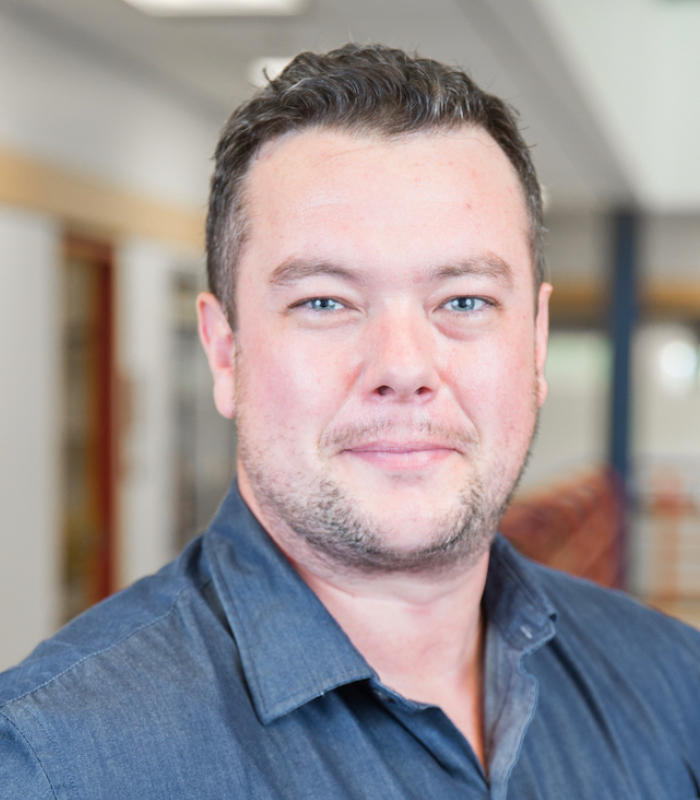May 17, 2021
Electrifying new research on the impact of head trauma in career fighters

The stakes are high in the world of combat sports, highlighted by accidental deaths that have occurred in the ring. Researchers in the Faculty of Kinesiology at UCalgary have a new technology that could help protect fighter brain health by providing trainers, coaches, and medical staff with important information for their ‘return-to-ring’ decision.

Next generation wearable device from PROTXX integrates neurophysiological diagnostics and non-pharmaceutical therapeutics.
Dr. Ryan Peters’ team has uncovered evidence of accelerated vestibular damage and aging in middle-aged career boxing and Muay Thai fighters. “Just as high-intensity sound can damage the hair cells of your auditory system, there is mounting evidence that high-intensity head motion from being repeatedly punched and kicked has a similar effect on the vestibular system,” says Peters, PhD.
The team recently published their research in the Journal of Neurotrauma, using a cutting-edge technique called Electrical Vestibular Stimulation (EVS). Peters is now collaborating with PROTXX Medical Ltd. to mobilize balance assessment and EVS technologies within a new wearable device.
Stimulating our 'sixth sense'
The vestibular organs of the inner ear sense head motion and are important for balance control, eye stabilization, blood pressure regulation, and a perception of orientation and motion (a so-called “sixth sense”). Delicate hair cell receptors inside the vestibular organs are deflected when the head moves, which is signalled to the central nervous system by electrical impulses; these vestibular signals help us balance the body by causing reflexes in our muscles that keep us from falling over.

Ryan Peters, assistant professor, Faculty of Kinesiology
Adrian Shellard

John Ralston, CEO PROTXX Medical Ltd.
The study team included Dr. Kathryn Schneider, PhD, Dr. Tyler Cluff, PhD, and Chris Banman, PhD student. Using EVS, they observed lower-strength, slower balance-correcting muscle reflexes in the fighters and a strong relationship with their total number of sparring and competitive bouts.
With greater fight exposure, these vestibular balance-correcting reflexes become weaker and delayed, suggesting that EVS-based balance assessments might provide a powerful new biomarker of head trauma.
Innovative partnerships drive potential
In the future, this new device could enable more precise in-clinic and remote diagnoses and treatment management for conditions such as stroke, spinal injuries, and invasive neurosurgeries, as well as healthy aging and neuro-degenerative conditions such as multiple sclerosis and Parkinson’s disease. “In the second year of our collaboration we look forward to exploring related neurostimulation therapeutics for these and other neurological conditions that can be delivered by this same device,” says PROTXX CEO John Ralston.
This research is further supported through a Mitacs Accelerate industry collaboration with wearables technology company, PROTXX Medical Ltd. Together they have developed a next generation wearable balance assessment device that includes EVS, for which they have recently filed a U.S. provisional patent.
Dr. Peters’ work in wearable technologies grew out of his collaboration with Kinesiology’s Dr. Ferber and University of Calgary’s Wearables Technology Research and Collaboration (We-TRAC), “I cannot thank the We-TRAC program enough for being an initial and continued funding supporter of this project,” says Peters.
Ryan Peters
Ryan Peters is an assistant professor in the Faculty of Kinesiology and a member of the Hotchkiss Brain Institute in the Cumming School of Medicine.
Brain and Mental Health strategy
Led by the Hotchkiss Brain Institute, Brain and Mental Health is one of six strategic research themes guiding the university towards its Eyes High goals.
Integrated Concussion Research Program
The Integrated Concussion Research Program (ICRP) is a university-wide initiative to study concussion, which has brought together experts from the Cumming School of Medicine, Faculty of Kinesiology, and Faculty of Arts, with support from the Alberta Children’s Hospital Research Institute (ACHRI) and the Hotchkiss Brain Institute (HBI).
Canadian Innovation Week at UCalgary
As part of UCalgary’s partnership with the Rideau Hall Foundation, we are celebrating Canadian Innovation Week. Join UCalgary experts and researchers May 17-21, for a week of conversation, inspiration and ideas. Learn more.
The Faculty of Kinesiology is ranked No. 1 in North America and No.11 in the world, according to the ShanghaiRanking’s Global Ranking of Sport Science Schools and Departments.










